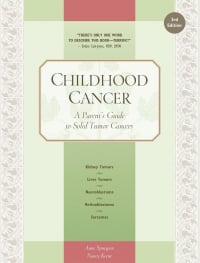Childhood Cancer
Avoiding communicable diseases
The dangers of communicable diseases to immunosuppressed children are discussed in Chapter 16, Common Side Effects of Treatment. The following information applies to children whose white blood cell counts are very low, which only occurs with some types of treatment.
Parents of children with low blood white cell counts need to work closely with the school to develop a plan for a chicken pox, whooping cough, measles, or flu outbreak if the school does not already have a communicable disease notification plan in place. If you know that children at school have these illnesses, you can keep your child at home. If your child is exposed to an illness at school, the school should notify you immediately so you can tell the oncologist.
Several methods can be used to ensure rapid reporting of outbreaks. Some parents notify all the classmates’ parents by letter to ask them for prompt reports of illness. If you have a good rapport with the teacher, ask that he or she immediately report to you any cases of communicable disease.
My daughter’s preschool was very concerned and organized about the disease reporting. They noted on each child’s folder whether he or she was immunized against measles, whooping cough, and chicken pox. They told each parent individually about the dangers to Katy, and then frequently reminded everyone in the monthly newsletters. The parents were absolutely great, and we always had time to keep her out of school until there were no new cases.
Other parents enlist the help of the office staff who answer the phone calls from parents of absent children.
We asked the two ladies in the office to write down the illness of any child in Mrs. Williams’ class. That way the teacher could check daily and call me if any of the kids in her class were ill.
Table of Contents
All Guides- Introduction
- 1. Diagnosis
- 2. Bone Sarcomas
- 3. Liver Cancers
- 4. Neuroblastoma
- 5. Retinoblastoma
- 6. Soft Tissue Sarcomas
- 7. Kidney Tumors
- 8. Telling Your Child and Others
- 9. Choosing a Treatment
- 10. Coping with Procedures
- 11. Forming a Partnership with the Medical Team
- 12. Hospitalization
- 13. Venous Catheters
- 14. Surgery
- 15. Chemotherapy
- 16. Common Side Effects of Treatment
- 17. Radiation Therapy
- 18. Stem Cell Transplantation
- 19. Siblings
- 20. Family and Friends
- 21. Communication and Behavior
- 22. School
- 23. Sources of Support
- 24. Nutrition
- 25. Medical and Financial Record-keeping
- 26. End of Treatment and Beyond
- 27. Recurrence
- 28. Death and Bereavement
- Appendix A. Blood Tests and What They Mean
- Appendix B. Resource Organizations
- Appendix C. Books, Websites, and Support Groups

